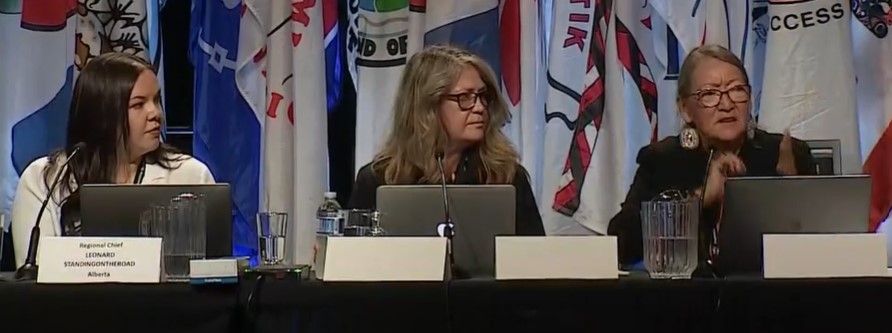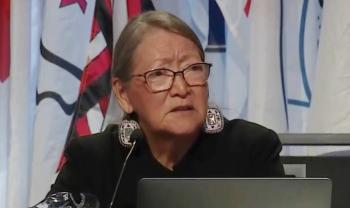Image Caption
Summary
Local Journalism Initiative Reporter
Windspeaker.com
Just the other day, said a young woman from the Peepeekisis Cree Nation in Saskatchewan, she was assaulted while attending the Assembly of First Nation’s annual general assembly in Halifax.
The statement was made before the assembly July 12, the second day of the three-day meeting and after a committee presented its findings on the sexualized violence and harassment that operates at all levels of the AFN.
The findings were stark: Harassment and discrimination exist and the committee heard many, many stories.
Bad behaviour has been normalized. There is abuse of power, position, authority and technology. Personal boundaries are pushed with unwanted touching and suggestive behaviour. There is lateral violence, bullying and verbal harassment.
The report is the result of work undertaken by a three-woman panel mandated by a resolution passed in 2020 entitled “Becoming a role model in ending sexual orientation and gender-based discrimination within the Assembly of First Nations.”

Panel members Gwendolyn Point (representing the AFN Knowledge Keepers Council), Debbie Hoffman (women’s council) and Amanda Barnaby Leroux (youth council) carried out an investigative review of the AFN, examining the incidences of sexual-orientation and gender-based discrimination and all other forms of violence, including sexualized and lateral, as well as bullying and cyberbullying within the organization.
They were also tasked with making recommendations.
The offensive behaviours are largely carried out by men, whether chiefs, Elders, Knowledge Keepers or male employees. And they carry on this behaviour because they are either protected by their own positions or by others who are in positions of power, the report reads.
“Behaviours described to the panel stem from, and we all know this, trauma. The trauma of residential schools, the 60s Scoop, forced assimilation, sexual abuse and the cultural genocide perpetrated on Indigenous peoples for generations in Canada. And that has resulted in a legacy of violent, abusive, discriminatory bullying and sexualized behaviours,” said Hoffman.
Those who are impacted by the behaviour talk about a “demoralized work culture,” she added, noting that, for many, the AFN is an organization they had strove to work for during their careers.
Instead, they experience fear of reprisal, lack of safety in the workplace or at events, breach of confidentiality and now lack of confidence and other mental health concerns.
“Unfortunately, a lot of people came forward, but they didn't feel comfortable then going on to have an interview with us and that was telling. They initially had the courage to come forward and tell us a little, but when we requested an interview, they just couldn't go any further,” said Hoffman.
That in itself spoke to the need for an independent office outside of the AFN structure that would offer transparency and accountability for people who had complaints, she said.
Such a place is among the eight recommendations made by the panel. Along with an independent office for complaints and investigations, the panel is also recommending doing away with non-disclosure agreements which, says the report, “are rooted in power imbalance.”
The panel called for decolonizing the AFN, returning to the seven sacred teachings—love, truth, wisdom, courage, humility, honesty and respect—and incorporating Indigenous culture and the use of ceremony as part of everyday life.
“We are deeply disturbed by the findings,” said interim National Chief Joanna Bernard. “No individual should ever experience sexual orientation or gender-based discrimination, hate or bullying of any kind.”
The panel also examined AFN’s internal documents and recommended broadening basic definitions for such words as “harassment,” “discrimination,” and “violence.”
The panel pointed out the obvious exclusion of any gender other than male in the NIB bylaws, with NIB standing for National Indigenous Brotherhood, the precursor to the AFN.
Also recommended was a threat of harm plan, which would be “implemented when responding to workplace violence, bullying, and discrimination (in all forms), in the same way that an organization would have a policy to implement when responding to a bomb threat.”
Mandatory training for the AFN executive and secretariat was also recommended along with onboarding training for new hires to the secretariat.
The panel recommended that the AFN adopt a trauma-informed approach that would make the workplace a safe place.
The woman who stood today to share her experience of the assault said that when she came forward with what had happened to her at the assembly she was supported and it was left up to her to determine the consequences for her abuser.
“This violence that men are committing is indicative of the fact that we’re not supporting men enough in their healing,” said the woman who stood.
She also said it was not the first time she had been assaulted, yet “I’m not cynical and bitter and I’m so grateful for all of the help.”
That spirit was also something Barnaby Leroux said was evident in the women who came forward to share their stories with the panel.
“Your willingness to be vulnerable, and your belief that the AFN can and must do better in providing a safer space for all is inspiring,” said Barnaby Leroux.
Point applauded leadership for its courage in tackling the difficult subject.
“I know it’s not easy to hear our reality and I tell that to people. We’re the ones that can change it,” she said. But the work needs to be done.
Bernard committed the AFN executive committee to taking “concrete action” to address the findings.
“We do not take this responsibility lightly. We are committed to fostering an inclusive and respectful environment where everyone feels safe and valued,” she said.
The woman who stood shared her own advice.
“The women who work here, we do what we do because, despite all this, the work that we accomplish together is incredible. We change the world. Maybe now we realize we need to change ourselves and how we do business with each other.”
The report can be found here: https://static1.squarespace.com/static/62716fed4cf5726ca8a1274b/t/64ac5471732830200cea3555/1689015414180/Final+English+Version+23-06-30.pdf
Local Journalism Initiative Reporters are supported by a financial contribution made by the Government of Canada.

